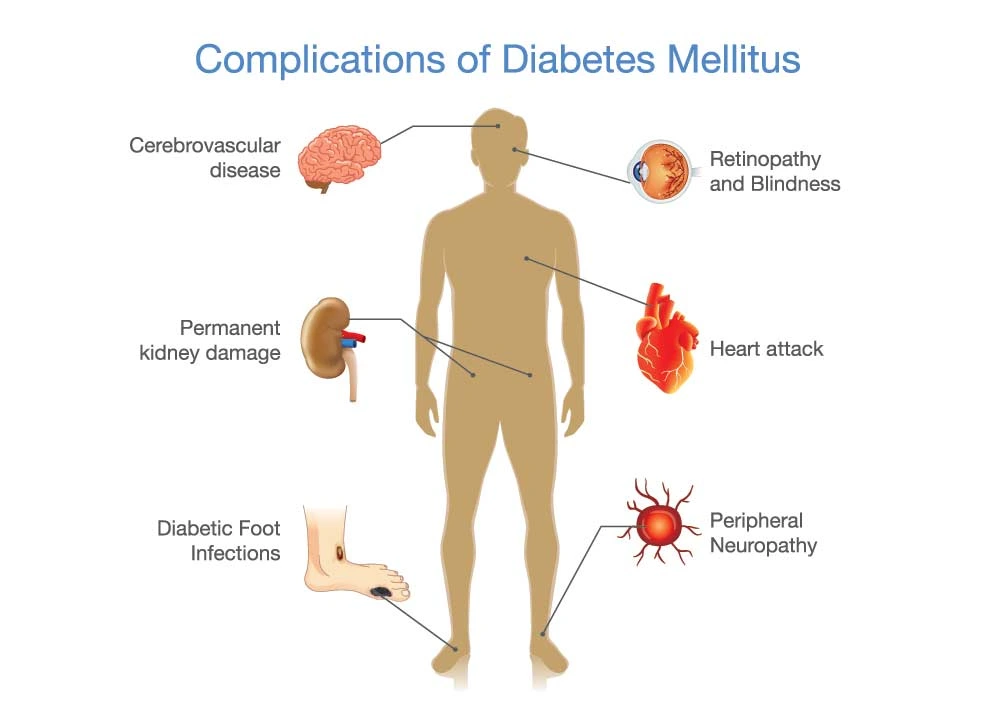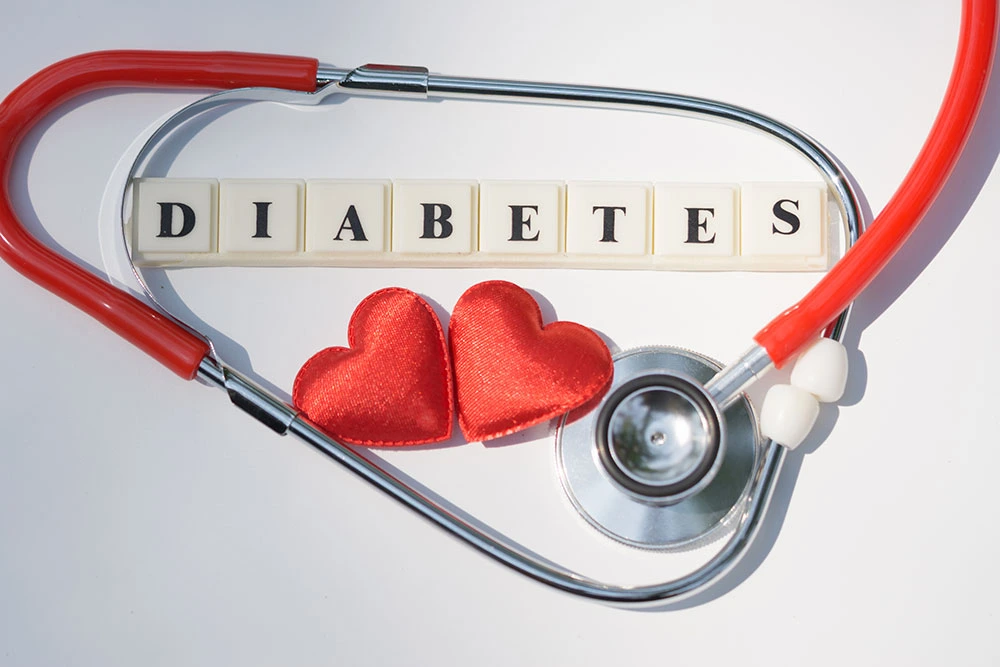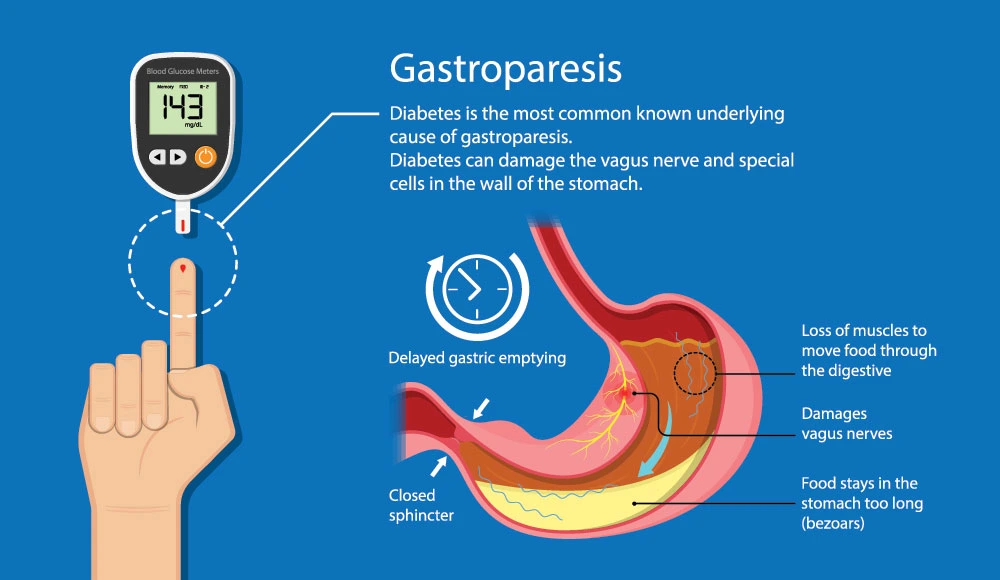Last updated on September 30th, 2022
Irrespective of the disease it is a fact that in the long run, all the diseases will impact our health and quality of life in the long run. Especially people suffering from diabetes type two need to be extra cautious. It is a proven fact that from head to toes, diabetes can affect your overall well-being. Moreover, inadequately managed blood sugar can result in a variety of health issues. Read this blog to know about the long-term complications of type 2 diabetes mellitus.
In the present times, the cases of various health issues arise mainly due to poor lifestyle choices and bad diet. However, the longer you have been affected by diabetes the higher is the risk of complications due to it. Therefore, if you are aware of the side effects and long-term implications of the disease it gets easier to deal with them or simply prevent them.
As per surveys conducted it is found that on average every four people out of 10 are suffering from any type of diabetes. The condition is scary and the situation in developed nations is all the worse. Thus, knowing about the causes, precautions, long-term effects, prevention, and cure of the disease can help you save from the adversities.

Long Term Complications of Type 2 Diabetes Mellitus
Summary
A type 2 diabetes patient always has to be aware that they could face certain long-term complications due to the medical condition. With this awareness, they can use the medical facilities to either prevent or reverse them.
Blood sugar is the amount of glucose or simple sugar in the blood. Glucose is the main source of energy for the body. Thus, it could result in several long term complications of type 2 diabetes mellitus which are as follows:
Also Read: Normal Blood Sugar Levels Chart For Adults
Cardiovascular Disease
Unmanaged blood sugar, in the long run, can damage the arteries. Diabetes causes an increase in triglycerides and LDL cholesterol which are bad cholesterol and clog the arteries leading to heart attack. Thus, as per surveys, it is witnessed that diabetic patients are more likely to be affected by cardiovascular issues. Thus consult the health expert and consult regarding the issue. Moreover, manage your blood pressure and cholesterol levels. Maintain your weight and indulge in a regular workout schedule. Consume well-balanced and nutritional food. Give up smoking as people with diabetes are more likely to be affected by heart disease.
Stroke
A stroke occurs when the blood clot blocks a blood vessel in the brain. It is a deadly matter and people with diabetes are more prone to suffer from stroke. Apart from diabetes if you have issues like:
- High blood pressure
- Heart diseases
- High blood pressure
- Obesity
- Smoking
If any of the above issues is there then consult your health expert and diabetes specialist for getting apt treatment and reducing the risk.
Also Read: Diabetes and Heart Disease
Vision problems
Diabetes has an alarming effect on the tiny blood vessels of the eyes. Thus, it could lead to issues such as:
- Glaucoma is a condition when there is fluid build-up in the eyes
- Cataracts that is clouding of the lens of the eyes
- Diabetes retinopathy where the retina present at the back of the eye is damaged
Over time diabetes can result in loss or blurred vision. Thus, getting regular eye check-ups done by an expert ophthalmologist is mandatory. Early detection can prevent serious damage. As per surveys, it is seen that early detection can prevent blindness by 90% in people with diabetes.
Also Read: How to Lower Blood Sugar?

Foot Ulcers
Diabetes can cause damage to nerves and blood circulation is then prohibited thus this can lead to foot problems like foot ulcers. If the ulcers are not detected and treated on time can get infectious and lead to gangrene or even may have to amputate the feet. There are few tips related to that can solve the problem:
- Keep the feet clean, dry, and protected from injury
- Wear comfortable, well-fitting shoes
- Check feet for rashes, sores, or blisters.
- In case of any foot, issue consult the doctor
Nerve Damage
Due to diabetes there is a risk of damage to nerves and resulting in pain termed as diabetic neuropathy. Rather it is one of the common complications that arise due to diabetes. There are different types of diabetic neuropathy. If it affects hands and feet then it’s called peripheral neuropathy and if it affects the nerves that control the organs of the body it is called autonomic neuropathy.
The symptoms of the disease are as follows:
- Numbness, tingling, or burning of hands and feet
- Vision problems
- Stabbing pain
- Chronic pain
- Sensitivity to touch
- Diarrhea
- Loss of balance
- Weakness
- Erectile dysfunction in males
- Vaginal dryness in females

Gastroparesis
It happens when the vagus nerve is damaged or it stops working. Thus, the stomach takes a longer time to empty its content. Medically it is referred to as delayed gastric emptying.
Symptoms of gastroparesis are as follows:
- Heartburn
- Nausea and vomiting
- Feeling of fullness
- Bloating
- Loss of appetite
- Weight loss
- Stomach spasms
Gastroparesis makes it difficult to manage blood sugar levels as food absorption is unpredictable. It is advised to manage blood sugar levels to control gastroparesis. For this, the doctor will adjust the insulin regimen. In such cases high fiber and high-fat foods. The best solution is eating small meals all throughout the day.
Kidney Damage
The threat of diabetes is to kidney. Thus, managing and monitoring sugar is vital for the good health of kidneys. High sugar in the bloodstream can hamper the ability of kidneys to filter waste. Thus, blood sugar and blood glucose levels need to be monitored regularly for good health. Therefore, if you have a family history of kidney disease then consult your doctor immediately. Symptoms of kidney issues are mostly overlooked as their weakness or sleep troubles which are often attributed to other issues. The most common sign of kidney issues in diabetes patients is the presence of protein in the urine. Thus, connect with your doctor and check protein levels in your body.
Also Read: Can Quitting Alcohol Reverse Diabetes?
Mental Health
Though the scientists don’t agree with the fact there is a link between diabetes and mental health. However, as per surveys, it is visualized that people with diabetes are at higher risk for certain conditions like anxiety, stress, and depression. Diabetes is emotionally draining and causes depression in people. Thus, taking help can prove beneficial.
Dementia
The presence of high sugar levels or high insulin can cause harm, to the brain. Thus, the relationship between dementia-related conditions and type 2 diabetes. Research proves that in diabetic patients’ cognitive conditions are present as follows:
- Mild cognitive impairment
- Vascular dementia
- Alzheimer’s disease
From surveys, it was concluded that having diabetes at a younger age can increase the chances of having dementia. Also, people with diabetes type 2 are 36% at a higher risk of having vascular dementia as compared to those without diabetes. However, the relation between Alzheimer’s disease and diabetes is not well explained and research in the aspect is being conducted.
Tooth Decay
If the blood sugar is not managed well then it harms the small blood vessels is damaged. This includes the small blood vessels that nourish the teeth and gums. And increases the risk of tooth decay and gum infections. Also, it is seen that people with diabetes are more prone to periodontal disease. Thus, diabetic patients need to consult the doctor every six months.

How to Prevent Long-Term Complications of Type 2 Diabetes Mellitus?
- Lifestyle changes, medications, and being proactive can help in controlling the long-term effects of diabetes or in some cases even reverse the case of diabetes.
- Check your blood sugar level daily- it is highly recommended that you maintain your blood sugar levels as per the doctor’s instructions. Consulting a specialist, in this case, is mandatory as it can help in making informed decisions regarding the ailment.
- Make dietary changes and include an exercise regime in your lifestyle- avoid sugar and high-fat food. It is mandatory to visit the doctor and maintain a healthy weight.
- Avoid alcohol and smoking- alcohol and smoking can affect the blood sugar levels and also conflict with the medicines thus they need to be avoided.
- Take care of mental health- not only physical health but even mental health is crucial. To stop or avoid the cravings for food that are off the list it is mandatory to consult an expert.
What are the Short-term Complications of Type 2 Diabetes Mellitus?
There are various short term side effects of type 2 diabetes-like:
- Hyperglycemia: Eating more sugar or carbohydrates than your body can handle is hyperglycemia. Thirst increased urination., and too much sugar in the urine are symptoms of hyperglycemia.
- Diabetic ketoacidosis: Ketoacidosis is a dangerous life-threatening condition. It is the case where the body does not produce the required amount of insulin. Here the body starts converting fats to get energy it may be beneficial for weight loss but then it results in ketones. The body tries to get rid of them as it is a waste product with excess urine. The extreme levels of ketones cannot be removed and they enter the bloodstream thus resulting in the ailment. Thus, if you feel extremely short breath, extremely dry mouth, fruity-smelling breath then it could be ketones and you need to visit the doctor for the same.
Also Read: Diabetes and Sleep Apnea
FAQs:
What are the chronic complications of diabetes?
The chronic complications associated with type 2 diabetes include health conditions such as nerve damage, eye damage, kidney issues, joint and foot problems, cognitive issues, and various other problems.
What kind of diet is recommended for Type 2 diabetes patients to help them avoid the long-term complications?
The dietary fiber present in whole grains, fruits, and vegetables are important for managing diabetes. They help in faster digestion and better bowel management thus the overall health is improved and also the long-term, effects of diabetes is reduced. Healthy fat like polyunsaturated fatty acids (PUFA) help in controlling the insulin levels in the body. It reduces the blood glucose levels, and thus should be in the diet. Seeds and lean meat are the best way to include healthy fat in your diet. Vegetables are essential in the diet as they are full of nutrition and thus need to be a part of our diet.
Are there any side effects of low blood sugar levels in diabetes type 2 patients?
Just like the long-term effects there are several short-term side effects of the same. Hypoglycemia is the most common short term side effect of type 2 diabetes. Blood sugar levels change throughout the day. If high blood sugar level is damaging then even low blood sugar is harmful. Symptoms of low blood sugar are as follows:
- Nausea
- Sweating
- Dizziness
- Headaches
- Tingling or numbness in feet or hands
- Anxiety, hungry, or weakness
In extreme cases it can result in fainting or seizures. If the blood sugar is too low then eat 15 grams of protein and wait for 15 minutes then check again if still its low then repeat again. Once the blood sugar levels are normal then consume normal nutritional meal.
Is it important to consult a doctor regularly?
Yes, going by the several researches done in all parts of world consulting a doctor regularly showed significant improvement in their blood sugar levels. In some cases, the patients were even off their medicines or the dose was reduced. Following what is recommended by doctor can help to reverse diabetes. Thus assemble a health care team and visit them for regular check-ups. With the help of your physician, you can understand as to which experts you need to consult depending on the long-term risks that can affect you. It is only with regular check-ups, tests, and increased awareness that the risk for type 2 diabetes can be avoided. Even if you do not see any symptoms it is advised to connect with your doctor and understand the signs that you need to look in your body.
Which foods should be completely prohibited for type 2 diabetes patients to reduce the long-term effects of the disease?
Sugar-loaded foods like soda, canned juices, sweets, desserts are totally prohibited for diabetes patients. These foods are also prohibited for people with heart issues or people who want to live a healthy life. Natural sweeteners like honey are also prohibited. Other foods that are prohibited include:
- Alcohol either sweetened or unsweetened is to be removed from diet
- Fatty foods like red meat, cheese, and butter should also be removed from the diet.
- Fried foods like chips, nuggets, and puris should not be consumed.
- Processed food like baked products, instant noodles, or instant meat should not be consumed.
References:
- www.emoha.com/blogs/health/indian-diet-for-diabetic-patients
- https://www.eatingwell.com
- https://goodhousekeeping.com
Last Updated on by Dr. Damanjit Duggal
Disclaimer
This site provides educational content; however, it is not a substitute for professional medical guidance. Readers should consult their healthcare professional for personalised guidance. We work hard to provide accurate and helpful information. Your well-being is important to us, and we value your feedback. To learn more, visit our editorial policy page for details on our content guidelines and the content creation process.

 English
English
















